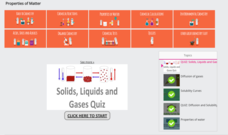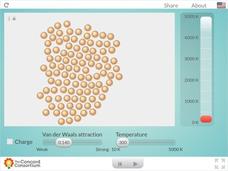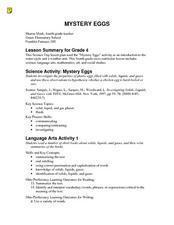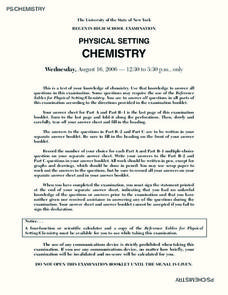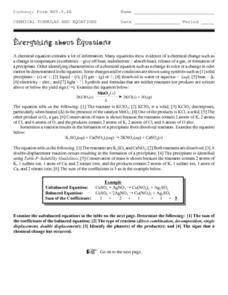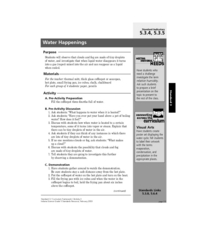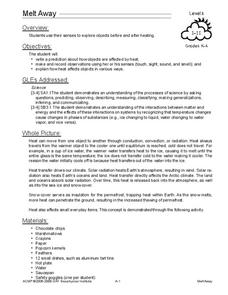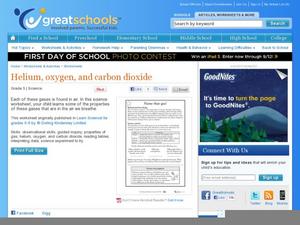Fuse School
Quiz: Solids, Liquids and Gases
Time to show what they know! Module five in a 14-part series about solids, liquids, and gases redirects to an interactive quiz. Learners test their skills on topics such as states of matter, phase changes, and Brownian Motion. With...
Concord Consortium
Charged and Neutral Atoms
Do charged and neutral particles behave differently as they undergo phase changes? Science sleuths examine two types of attractive forces using an informative interactive. Pupils can vary the amount of Van der Waals attraction present...
Curated OER
Mystery Eggs
Students investigate the properties of plastic eggs filled with solids, liquids, and gases and use these observations to hypothesize whether a chicken egg is hard-boiled or raw.
Curated OER
Regents High School Examination PHYSICAL SETTING CHEMISTRY 2006
The 2006 version of the Regents High School Exam is just as thorough as the rest of them! Assess chemistry learners on an entire year's curriculum when they take this thirteen page test.
Curated OER
Solids, Liquids and Gases - Part 2
Students experiment with balloons, soda water and raisins to find out about the states of matter. In this solids, liquids and gases lesson, students complete a group activity with balloons to recognize the state of matter in it....
Curated OER
Heat Transfer & Phase Changes
For this heat transfer and phase change worksheet, students experiment with ice, salt, and milk to show the relationship between the temperature of a solution and its phase. Students turn milk from a liquid to a solid and graph the...
Curated OER
The Bending and Bouncing of Light
Students investigate refraction and reflection of light. For this light lesson, students perform 3 activities to observe light interacting with matter by using a flashlight. They explore refraction using a glass of water and reflection...
Curated OER
Everything about Equations
In this chemical reactions instructional activity, students are given fifteen unbalanced equations and they must identify the reaction types, the phases of the products, the signs that a chemical change occurred and the sum of the...
Curated OER
Matter & Subatomic Particles
Seventh graders divide into small groups to construct several models. Each group builds with an accompanying chart showing the colors of gumdrops used for the protons, electrons, and neutrons.)
Curated OER
BioFuels: The Chemistry and Economics of Alternative Fuels
Junior chemists manufacture biodiesel in the lab. For this exercise, they check the purity of the biodiesel using thin layer chromatography. They also calculate its density and heat of combustion. They are sure to rise to the...
Curated OER
Heating/Cooling Curve
In this heating and cooling curve worksheet, students use a given graph of a substance being heated from a solid to a liquid and then a gas over time. They use the graph to answer eleven questions about the phases of the substance and...
Curated OER
Solids, Liquids, and Gases
First graders explore the properties of matter. In this states of matter activity, 1st graders conduct scientific investigations that require them to mix, cool, and heat objects in order to observe changes in the properties of matter.
Curated OER
Water Happenings
Fifth graders observe how water changes phase through a teacher-led demo. In this earth science lesson, 5th graders relate the demo to the water cycle. They draw and label each stage of the cycle.
Virginia Department of Education
Soap, Slime, and Creative Chromatography
Do you think chromatography paper suffers from separation anxiety? Young chemists make soap, slime, silly putty, and experiment with chromatography in this lesson. The material includes clear instructions for each experiment along with...
Curated OER
What is in the Water?
In this mixtures worksheet, students read about mixture and what determines if a solute dissolves in a solvent. They answer three questions about solutions and determine from a list of compounds which are soluble in water.
Mr. E. Science
Thermal Energy and Heat
The presentation covers Fahrenheit, Celsius, and Kelvin scales for temperature as well as conduction, convection, and radiation.
NorthEast Ohio Geoscience Education Outreach
Density and Pressure of a Hot Air Balloon
Using a dry cleaner bag and a blow dryer, create a hot air balloon! The materials list suggests obtaining one dry cleaner bag per student, but since this is probably inconvenient, consider doing this as a demonstration during a lesson on...
Curated OER
Melt Away
Students explore objects before and after heating using their senses. In this matter and energy lesson, students experiment with a variety of objects and use their senses (except taste) to make predictions and record observations...
Curated OER
Name That Gas!
Young scientists discover that air is a mixture of different gases - mainly nitrogen and oxygen. The properties of some of the other gases found in oxygen are listed in a table, then learners must decide which one of those gases is...
Curated OER
Warming by Freezing
Ninth graders discover the reasoning behind spraying water on fruit and seedlings in preparation for hard freezes. In this conceptual physics lesson, 9th graders conduct an experiment to measure the heat released when water goes from a...
Curated OER
It's a Gas! Or is it?
Examine the effects of temperature and pressure on solubility and the states of matter of ocean water. Learners make inferences about the unique chemistry of ocean water at different depths. They engage in an activity related to...
Messenger Education
Cooling with Sunshades
Messenger's sun shade measures 8 ft x 6 ft and will have temperatures reaching 700 degree Fahrenheit on the outside while maintaining a cool 70 degrees underneath. In the third activity of four, groups discuss the basic properties of...
Leadership Challenge
Helping Students See the "Gift" in Feedback
How can you help pupils view feedback as a blessing and not a curse? Lesson seven in a series of 12 character and leadership activities focuses on the S.A.R.A mindset and how to support budding leaders in their journeys toward the...
Curated OER
The Same But Different
Fourth graders identify the characteristics of a simple physical change. They describe objects by the properties of the materials from which they are made. Students discuss the different states of matter and their distinct physical...
